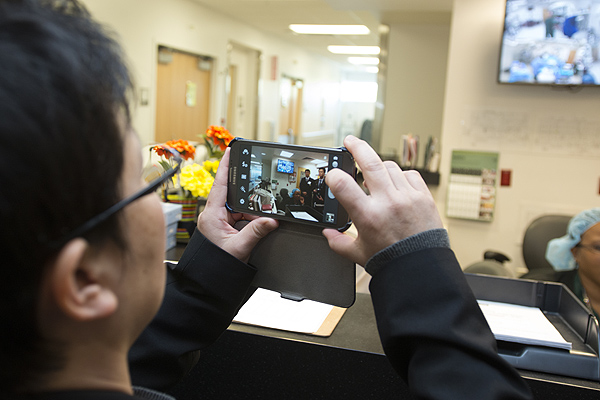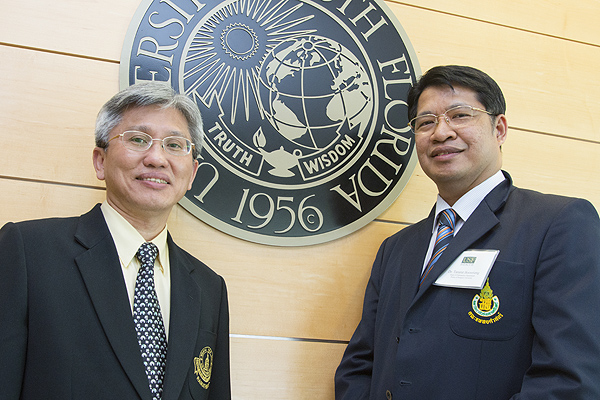
The Thai delegates toured the ambulatory surgery center at Morsani Center for Advanced Healthcare as part of the intensive, three-week LEAD hospital administrator training program hosted by USF and Tampa General Hospital.
Senior-level administrators from hospitals and academic medical centers across Thailand visited USF Health in February and early March to participate in USF Health International’s three-week Leadership Enhancement and Development (LEAD) Hospital Administrator Training.
Representing 16 hospitals and medical colleges, the two Thai delegations were comprised of deans as well as CEOs and vice presidents of hospitals across Thailand, a nation of 69 million people. They attended the intensive health care leadership and management training as part of USF Health’s educational and research partnership with Srinakharinwirot University (SWU), a public university in Bangkok, Thailand, with branch campuses throughout the country.
The tailored training program, hosted by USF and Tampa General Hospital, immersed the Thai doctors in topics ranging from U.S. health care reform and the future of medicine to leading change effectively in health care management.

The delegates toured some of the most innovative centers at USF Health, including CAMLS, the Morsani Center for Advanced Healthcare, the Byrd Alzheimer’s Institute, and the Center of Excellence for Aging and Brain Repair. They visited USF Health-affiliated teaching facilities, including Tampa General, Moffitt Cancer Center, Shriner’s Hospital and the Hillsborough County Health Department. They observed first-hand the work flow at the USF South Tampa campus and Tampa General. They were taught new strategies, skills and techniques for better managing employees and hospital systems to deliver high-quality patient care.
“By building the capacity of health care providers to better manage their hospitals, the ultimate goal of the LEAD program is to improve patient outcomes and the health of the communities that their hospitals serve,” said Lynette Menezes, PhD, assistant vice president of USF Health International and assistant dean for USF Medicine International at the Morsani College of Medicine.
Dr. Wuttichai Thanapongsathorn, dean of the Faculty of Medicine at SWU, worked with USF Health’s Dr. John Sinnott, Dr. Douglas Holt, Dr. Robert Brooks, and Dr. Menezes; Ron Hytoff, former CEO of Tampa General; and Mo Kasti, executive director of the USF Center for Transformation and Innovation, to customize the LEAD program’s curriculum to meet the needs of the Thai trainees.

The USF Diabetes Center was one stop on the in-depth tour of the Morsani Center.
Within the last decade, Thailand has attained universal healthcare coverage for virtually its entire population, primarily through three health insurance models — a civil servant medical benefit program for government employees and their families and government retirees, a social security health insurance program for private sector employees, and a universal coverage program with capitated health care, which covers most of the rest of the population.
While Thailand has made impressive progress in improving access to affordable health care, big challenges remain, said Dr. Tanarat Boonriong, chair of the Department of Orthopaedic Surgery at Prince of Songkla University. These include some of the same challenges faced by the U.S. health care system, such as how to ensure sufficient health resources to meet current shortages, addressing the chronic care needs of an aging population, and mitigating socio-economic inequities.
“Health care resources are diminishing everywhere, so we need to find innovative ways to survive and move forward,” Dr. Boonriong said. “The biggest challenge is organizing the system of care so that it works effectively” to optimize health and reduce costs.

Dr. Susarak Leelaudomlimpi, director of the Vascular Surgery Department at Ramathibodi Hospital, and Dr. Tanarat Boonriong, chair of the Department of Orthopaedic Surgery at Prince of Songkla University, said they enjoyed the opportunity to exchange ideas with U.S. physicians and hospital administrators.
Dr. Surasak Leelaudomlipi, director of the Vascular Surgery Department at Ramathibodi Hospital, said that the delegation appreciated the opportunity to gain some practical insight about the business operation of USF’s academic health center and some of its major affiliates.
“USF’s hospitality has been wonderful,” Dr. Leelaudomlipi said. “The exchange of experiences and ideas facilitated by this training program will help improve our leadership ability back home.”
The inaugural LEAD hospital administrator training program was held in January 2010 for a group of hospital vice presidents from Gansu, China. Since then, USF Medicine International has trained more than 60 Chinese administrators from 17 hospitals in the Gansu province.
Through its LEAD programs, USF Medicine International has forged global partnerships with hospitals, governments and universities, strengthening the leadership and management skills of healthcare personnel in China and Thailand, Dr. Menezes said.

The delegation shows its USF Bulls spirit.
Photos by Eric Younghans, USF Health Communications
